Hi-
I’m so sorry you’re having such a time trying to help this cat. Has your vet ruled out everything else as far as a diagnosis? Perhaps there is something else that is worsening her initial issue? Have you tried feeding more meals throughout the day, but smaller portions? (A little at a time)
I have an 18 month old male cat, Chubbs 🙂 – he was a stray that we took in from the neighborhood as a kitten, vaccinated and neutered and we just adore him. On Monday this week, I noticed he was having urinary issues – lots of in and out of box and no action. Our vet was full so we drove about 30 minutes to another town to take him to an emergency vet. Vet told me that he did not have a urinary blockage, but his urinalysis showed evidence of infection and crystals. A chicken and the egg situation he said. They gave him subQ fluids, antinausea med, anti-inflammatory med and send us home with a supply of pain meds and antibiotics. He was low key the next day, but seems back to normal as of yesterday. However, still lots of urinary urgency and frequency attempts with dribbles here and there, but is producing actual normal appearing size voids 3-5 times a day. No blood, no howling. Bowel movements seem a little looser, assuming from antibiotics but no diarrhea. Is this expected behavior? Can male cats have partial blockages that wax and wane like this? Will this continue on for 1-2 weeks while treating the UTI component? Emergency vet told me to follow-up with our vet in ~2 weeks for repeat urine.
Comments
I have a 12 year old cat who vomits almost every day since I adopted her 5 months ago. She has been to the vet several times and a sonogram revealed she has chronic pancreatitis. They didn’t see any other issues. She was eating canned Fancy Feast with water, but now I have her on NomNomNow because I thought fresh food would help her. But she is still vomiting. It’s usually food at first but then she moves spots and vomits bile or saliva/foam. Once or twice the saliva looked bloody (took her to the vet right after). The vet had her on vitamin E, pepcid, and a round of antibiotics. Nothing helped. She has never been very playful but she is behaving relatively normally, eats, grooms, poops, etc. I don’t know what else to do! Thanks for any advice!
Comments
Just noticed fleas on both of my cats.. what is the safest treatment to use?
Comments
My 8 year old Belgian Malinois had surgery to remove her salivary gland on June 11, 2019. It was quite an extensive surgery because her salivary gland had ruptured and there were a lot of stones present. I was giving her a bath yesterday feeling in the area where the surgery was and I can feel what I believe is her lymph node or something firm on the side of where the surgery was. Below are pictures of what I am seeing. Could this be lymphoma starting (I lost a dog to that in December) or is it from the surgery. I am so worried! No ER’s where I am at so waiting till tomorrow to take her back in but for now I would like to know ideas on this.
Comments
My cat disappeared outdoors for numerous days (he’s indoor, but LOVED it out at night) I always had the back door a bit loosely closed, so he could get back in. He was 12yo and could get in.
After days of worry and a small sighting of him, he came to me gaunt and meowing. He wasn’t a big meower— It was sad sounding as well.
After 1 1/2 days of exhibiting odd spots to just lay around the house, he deteriorated in hours. I found him with vomit at his mouth and what appeared to be urine at his backside. He had passed.
My husband was convinced that our new dog just bothered him enough to the point that he’d gone to our neighbors, outside. Or was being fed somewhere. I looked for him constantly and only once did he attempt to come up to me. After a few days, to see him in such weak and fragile state, I’m so horrified at what was going on; to which I have no answered questions and regrets.
*He weighed considerably less upon returning home
*He was a WELL fed cat (didn’t eat after returning)
*He recently (2mo prior) had blood work done and his shots. Not cancer/diabetes
*He deteriorated very quickly (when he couldn’t walk and use his back legs, he passed before anything could happen; ie; vet etc)
*He didn’t seem to to be able to eat? My last time trying to feed him, he’s s head repeatedly tapped the bowl. Uncontrollably and he couldn’t get food. This being before he went. -It was awful-. I left food by him and went to explain the severity to my husband.
Prior to disappearing, he seemed in perfect health at 12.
So overnight he couldn’t walk and within the hour of dying, function. He laid and went. Vomit at his mouth (some food by his head partially chewed)
And urine stain backside.
I’m devastated. Please help!
Comments
I just recently moved in with my S/O and their dog hates it. She gets jealous. She didnt pee in the floor before and now she does. She always has to be under the covers and worms her way in between us. She stares at me all the time and when i walk towards her she rolls on her back and shows me her stomach. If we leave her outside of the room she whines and claws at the door. When its just me home she doesnt get in the bed, but if hes home she’ll hop right up with us. Im at a whits end.
Comments
I just recently moved in with my S/O and their dog hates it. She gets jealous. She didnt pee in the floor before and now she does. She always has to be under the covers and worms her way in between us. She stares at me all the time and when i walk towards her she rolls on her back and shows me her stomach. If we leave her outside of the room she whines and claws at the door. When its just me home she doesnt get in the bed, but if hes home she’ll hop right up with us. Im at a whits end.
Comments
Had CT done of my cat Lucas due to no resolution of respiratory problems with antibiotics. Here are the results.
Moderate to marked thickening of the roof of the nasopharynx
• Otitis media bilaterally
• Lymphadenopathy left medial retropharyngeal lymph node
The marked thickening of the mucosal lining of the roof of the nasopharynx in conjunction withthe enlarged left medial retropharyngeal lymph node are highly suggestive for neoplastic
, and round cell neoplasia is the top differential diagnosis. Differentials include mast-
cell tumor, squamous cell carcinoma, adenocarcinoma, other. The mucosal thickening of the roof
of the nasopharynx can explain the bilateral otitis media due to mechanical obstruction of the
openings of the auditory tubes into the nasopharynx. A differential to neoplastic infiltration is
marked non-infectious inflammation (e.g. lymphocytic plasmacytic, eosinophilic) or
granulomatous inflammation (e.g. Cryptococcosis) but the later one is considered far less likely
here. The findings are not typical for inflammatory polyps.The bilateral otitis media is explains the history of head tilt and Horner’s syndrome.
Rhinoscopy/retrograde pharyngoscopy is recommended for further evaluation including FNA
sampling and biopsy. FNA sampling of the left medial retropharyngeal lymph node is warranted
as well. The prednisolone treatment may influence results of the samples.
I think all the tests and surgeries that may follow will be out of my budget. Already spent over $1000 to date with no resolution.
Wondering if there are veterinarians who would go in and remove the polyp – appears to be a poly under soft palate – just to give the cat some relief and time.
Opinions and suggestions are welcome.






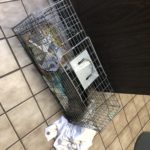
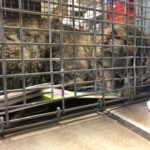
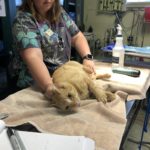
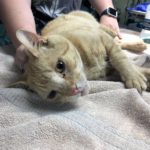

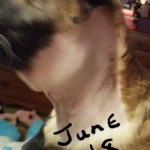
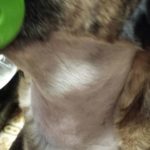
I would call your vet and see if you can schedule an appointment before the two weeks just to get your own vet up to speed and see if there are any changes in diagnosis. Err on the side of caution. I can tell you from experience- getting these things taken care of sooner rather than later and staying ahead of the game, is a LOT less expensive in the long run. Best of luck.